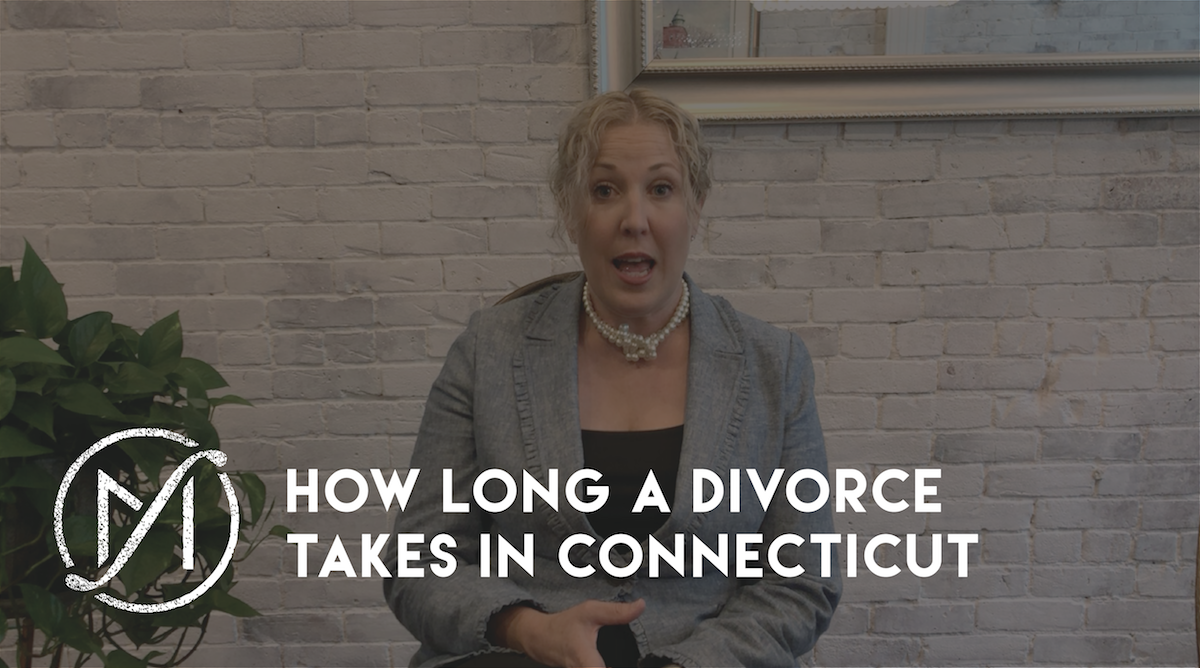Many people ask us how long does a divorce take in Connecticut?. Read on to learn more about how long divorces tend to take — as well as some tips that tend to speed up the timeline.
How Long Do Divorces Take on Average?
In our experience at Freed Marcroft, typical divorce timelines range from about 4 to 18 months.
Is There a Statutory Waiting Period for Connecticut Divorces?
Up until recently, there was a 90-day statutory waiting period before you could get divorced in Connecticut. Now, though, if you and your spouse reach a full agreement on all issues in your divorce, you can move the court to waive the 90-day statutory waiting period requirement.
This is commonly used in mediation and collaborative divorce as well and some low-conflict litigations.
Click here to learn more about how to choose your approach to divorce between mediation, collaborative, and high- and low-conflict litigation.
What Impacts the Divorce Timeline?
The complexity of the Issues
One major factor in the timeframe is the complexity of the issues – for example such as a when someone owns a business or has a complicated compensation structure, there is a concern that a spouse is hiding money, or disagreement around parenting and custody results in a professional evaluation.
Spouses’ Ability to Reach Agreements
Things normally go faster if both spouses are responsive, organized, and have the ability and desire to reach agreements rather than have a judge decide. More than anything, the level of cooperation or conflict that exists between the two people divorcing has the most significant impact. Generally speaking, the more agreements that can be reached out of court the better. You won’t just save time, you will also save money and emotional upheaval.
There is a saying that “divorce only goes as fast as the slowest person.” Plus, there can be an inherent delay with the court itself, so the more the spouses and lawyers can work out outside of court, the faster we get to the finish line. To that end — you want to make sure you select legal counsel who committed to moving you forward. They should ask you about whether the timeline is a priority of yours, be organized, and be skilled in negotiating outside of court.
What You Can Do to Impact Your Divorce’s Timeline
As we discussed, focusing on reaching agreements and hiring divorce counsel focused on your goals can have a big impact and speed up your divorce.
Although you can’t control your spouse’s decisions, timeframe, or choice of lawyer, you do remain in charge of yourself. Even if your spouse is less motivated to finalize the divorce than you are and there is more delay than is ideal, there are things that we can do while the divorce is still pending to make the wait more comfortable for you. For example, it is possible to have alimony begin while a divorce is still pending. And, for some couples, not living under the same roof while your divorce is pending can provide you with some privacy and space.
Most critically, though, if you identify and stay focused on your goals, you will be well-positioned to save time, money, and stress.
Read: Timeline of a Connecticut Divorce
Next Steps
We have designed our first step, the Goals & Planning Conference, to help you figure out your goals.
The reason identifying goals matters so much is if you don’t know what your goals are, and you don’t have a plan to get them, you will end up with whatever you end up with once your divorce is over. At the Goals & Planning Conference, together we will put in the time and effort to help you figure out what you truly want so that we can make a plan for how to get it. That doesn’t guarantee you will get it, but you will have a better chance. And, you will be set up down the line to stay focused on your big picture, high-level goals rather than on the day-to-day.
Schedule your Goals & Planning Conference today, or contact us here.









